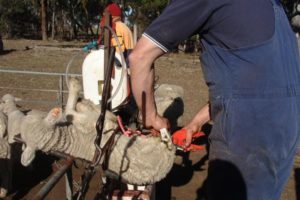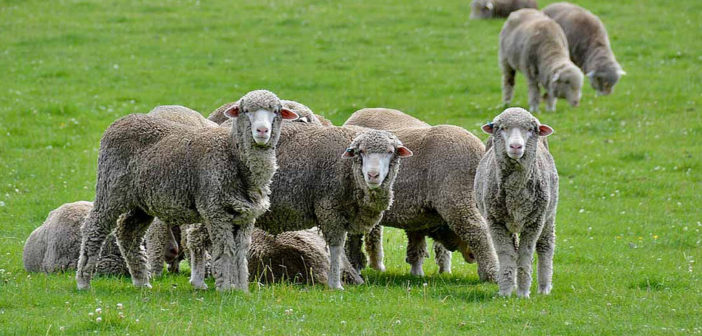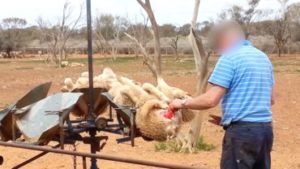Among all the cruel practices that involve animals suffering for people’s “needs” or, rather, non-essential desires, you may not know about one that involves sheep undergoing a removal of parts of their skin in order to prevent a parasitic infection called “flystrike.” Yet, a vast majority of people use wool on a daily basis, probably without realizing that most of it comes from Australia, where this cruel practice is fully legal and considered normal.
What is mulesing?
The procedure called mulesing mainly involves Merino sheep, a breed largely present in Australia, who have particularly wrinkled skin, meaning more wool per sheep. These animals often suffer from an excess of wool, and some even die of heat exhaustion during hot periods. Their wool also collects more moisture when they urinate. This excess moisture attracts flies, who lay eggs on the sheep’s skin that can later eat the animal’s flesh alive. Most ranchers see mulesing as a cost-effective solution to this problem.
The procedure involves cutting off part of the skin and wool from the sheep’s backsides while they are forced onto their backs with their legs restrained between metal bars. It aims to prevent flystrike, but it only affects the area where skin has been cut out, and it has no effect on potential flystrike on the rest of the animal’s body. Moreover, the procedure is known to be extremely painful for the animal. Unfortunately, this knowledge has not caused ranchers to switch to more humane methods of infection prevention, nor does it make them use painkillers or anesthesia in most cases. This system, where sheep are used purely to generate money while people completely ignore the fact that they are sentient beings, persists despite being criticized by animal advocates for years and despite the fact that many more humane options have been proposed.

Mulesing is done with a sharp instrument, usually with no painkillers or anasthesia. Image via OIPA International.
An unnecessary torture in an era full of new methods
Alternative methods to mulesing vary from primitive to more advanced. The first method consists of breeding programs, selecting more plain-bodied sheep in order to make them more resistant to flystrike and to produce a breed that would better tolerate the Australian climate. Even studies from almost a century ago show that more plain-bodied sheep are much less susceptible to infections than the wrinkly-skinned ones. There are multiple non-surgical alternatives as well, such as using insecticides that are now easily available in large quantities. Having an insecticide dip applied across the animal’s body is much more effective and practical than cutting off part of their skin. Other solutions include diet regulation and spray washing. All of these alternatives have proven to be more cost-effective than mulesing, in addition to not being cruel and painful practices.
Opposition to an outdated practice
As people are more aware of the terrible suffering that sheep have to go through for a brand new scarf or a soft sweater, many companies have stopped using wool sourced from mulesed sheep, and even entire countries have implemented an outright ban on mulesing. These companies include mass-market giant H&M, major sporting goods house Adidas, important players of the fashion scene like HUGO BOSS and Abercrombie & Fitch Co., and many others like Perry Ellis, New Look, and John Lewis. In addition, Sweden banned the purchase of all wool from sheep that have been mulesed after a TV program exposing the practice aired on Swedish television. The program elicited a large response from the public, and all manufacturers and retailers in the country implemented a ban on wool from mulesed sheep. Other European retailers decided to lift their ban on mulesing if pain relief was used during the procedure.
One of the biggest achievements towards stopping this practice is definitely the recent ban in New Zealand. Anyone who illegally practices mulesing can be charged with a criminal offense and fined a $5,000 penalty for an individual offender or $25,000 for a business. The ban is extremely important for the entire world community, marking a milestone in the global fight against mulesing. Moreover, seeing such change in a country that is one of the biggest wool exporters worldwide will have an important impact and set a powerful example to all other countries, like Australia, who continue to practice this inhumane procedure on sheep.
OIPA’s comment
OIPA strongly condemns any mulesing practice, with or without painkillers. It is a cruel procedure that implies a general inhumane treatment of sheep. Castration by banding, inadequate shearing blades that hurt the animal, and many lambs who die of excessive cold or heat since breeding seasons are dictated by the industry and not by nature: this is the reality that sheep have to live everyday. Mulesing is just one of the most shocking examples of a larger problem of animal abuse in sheep farming. This includes not only physical mistreatment, but also emotional and psychological abuse, since sheep are sentient beings, capable of suffering and feeling pain and stress.
We invite all countries and retailers worldwide to follow the examples of Sweden and New Zealand and adopt legal measures to ban such unnecessary cruelty. Such ambitious results can only be achieved if all of us start paying attention to where our woolen clothes come from, and an even better and more effective solution would be to stop buying wool in general. We strongly believe in the possibility of a mulesing-free world.
As former Australian Wool Innovation board member Chick Olsson commented on New Zealand’s initiative in a press release, “They have clearly identified consumers’ preferences and they have legislated to match those preferences.” OIPA genuinely hopes to see other countries follow this initiative and show a cruelty-free, humane attitude towards sheep and all living beings.
Featured image: Merino sheep, the variety who most often experience mulesing. Image credit Shellie, CC BY-SA 3.0.







